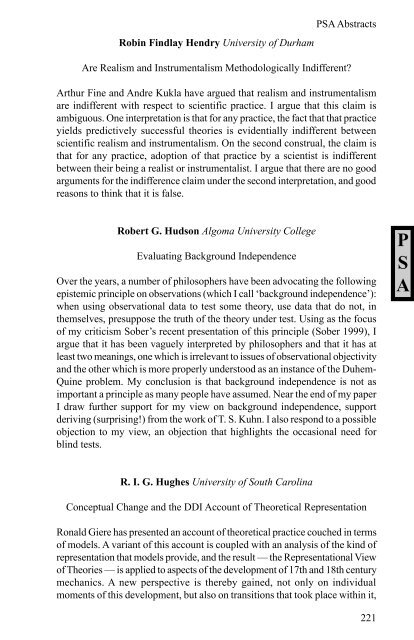2000 HSS/PSA Program 1 - History of Science Society
2000 HSS/PSA Program 1 - History of Science Society
2000 HSS/PSA Program 1 - History of Science Society
Create successful ePaper yourself
Turn your PDF publications into a flip-book with our unique Google optimized e-Paper software.
<strong>PSA</strong> Abstracts<br />
Robin␣ Findlay Hendry University <strong>of</strong> Durham<br />
Are Realism and Instrumentalism Methodologically Indifferent?<br />
Arthur Fine and Andre Kukla have argued that realism and instrumentalism<br />
are indifferent with respect to scientific practice. I argue that this claim is<br />
ambiguous. One interpretation is that for any practice, the fact that that practice<br />
yields predictively successful theories is evidentially indifferent between<br />
scientific realism and instrumentalism. On the second construal, the claim is<br />
that for any practice, adoption <strong>of</strong> that practice by a scientist is indifferent<br />
between their being a realist or instrumentalist. I argue that there are no good<br />
arguments for the indifference claim under the second interpretation, and good<br />
reasons to think that it is false.<br />
Robert␣ G. Hudson Algoma University College<br />
Evaluating Background Independence<br />
Over the years, a number <strong>of</strong> philosophers have been advocating the following<br />
epistemic principle on observations (which I call ‘background independence’):<br />
when using observational data to test some theory, use data that do not, in<br />
themselves, presuppose the truth <strong>of</strong> the theory under test. Using as the focus<br />
<strong>of</strong> my criticism Sober’s recent presentation <strong>of</strong> this principle (Sober 1999), I<br />
argue that it has been vaguely interpreted by philosophers and that it has at<br />
least two meanings, one which is irrelevant to issues <strong>of</strong> observational objectivity<br />
and the other which is more properly understood as an instance <strong>of</strong> the Duhem-<br />
Quine problem. My conclusion is that background independence is not as<br />
important a principle as many people have assumed. Near the end <strong>of</strong> my paper<br />
I draw further support for my view on background independence, support<br />
deriving (surprising!) from the work <strong>of</strong> T. S. Kuhn. I also respond to a possible<br />
objection to my view, an objection that highlights the occasional need for<br />
blind tests.<br />
P<br />
S<br />
A<br />
R.␣ I.␣ G. Hughes University <strong>of</strong> South Carolina<br />
Conceptual Change and the DDI Account <strong>of</strong> Theoretical Representation<br />
Ronald Giere has presented an account <strong>of</strong> theoretical practice couched in terms<br />
<strong>of</strong> models. A variant <strong>of</strong> this account is coupled with an analysis <strong>of</strong> the kind <strong>of</strong><br />
representation that models provide, and the result — the Representational View<br />
<strong>of</strong> Theories — is applied to aspects <strong>of</strong> the development <strong>of</strong> 17th and 18th century<br />
mechanics. A new perspective is thereby gained, not only on individual<br />
moments <strong>of</strong> this development, but also on transitions that took place within it,<br />
221
















